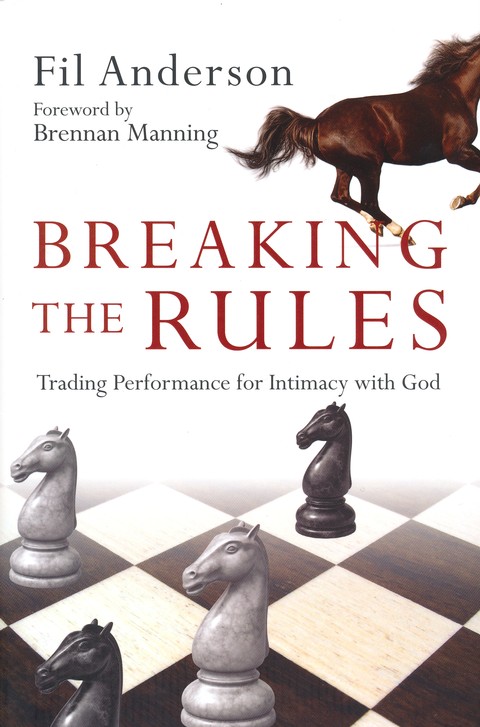How to Break the Religious Rules Without Breaking Yourself

Editor's Note: The following is a report on the practical applications of Fil Anderson's recent book, Breaking the Rules: Trading Performance for Intimacy with God, (InterVarsity Press, 2010).
Read your Bible every day. Don't cuss. Attend worship services at church at least once each week. Don't drink alcohol. Volunteer for lots of service projects. Don't watch certain movies, etc., etc., etc.… The demands and pressures of trying to keep up with religious rules will only frustrate and burn you out - no matter how hard you try. The good news is that God doesn't require you to follow any rules; he invites you to pursue a relationship with Him. In the process, he'll empower you to live a faithful life that leads to real freedom.
Here's how you can break religious rules so you'll be free to pursue a close relationship with God:
Place your faith in God, not religion. Ask yourself honestly if your allegiance is simply to good moral habits and churchy routines, or if it's directly to God. Rather than placing your faith in believing and doing what's right and then relying on your own efforts to try to accomplish it, place your faith in God, trusting Him completely to lead you and empower you to follow where He leads you.
Realize that God doesn't think like you do. Religious people are often disappointed when God doesn't act according to their assumptions about how He should and will act. Accept the fact that God may choose to act in ways that are radically different from what you expect or desire - but trust Him to do what's best, even when you don't understand why He's doing what He's doing. God's perspective is far greater than yours, and He often appears in unpredictable places.
Find the beauty in brokenness. While religion urges you to try to fix the brokenness in your life, God often calls you to accept the brokenness, because it's a powerful tool to draw you closer to Him. Brokenness has the power to mold you character into the unique shape God intended for it. As you face the reality of your own brokenness, don't feel guilty and ashamed for not measuring up and try to hide, avoid, deny, or despise your brokenness. Instead, invite God to use your brokenness to teach you beautiful lessons that will make you a stronger person.
Look beyond your appearance. Don't waste time or energy trying to keep up the appearance of a person who has it all together, as religion urges you to do. Ask God to give you the courage to accept yourself as you are and to be yourself openly and honestly in your relationships with Him and other people. Let the knowledge that God loves you completely - just as you are - motivate you to stop pretending and simply be yourself.
Invest in relationships over rules. All of the world's religions except for Christianity urge their followers to try to climb a stairway to heaven, striving to please God through their own efforts. But Jesus showed us that God is reaching down to us with His love, and that's the only way God and people can truly connect. Recognize that, even though you're flawed, you're also forgiven. Accept Jesus' invitation to live a life of freedom by pursuing a relationship with Him rather than trying to follow religious rules.
Ask God to help you see yourself as He sees you. When you view yourself from God's perspective, you can clearly see how to live without having religion tell you.
Focus on friendship, and then service. Remember that, while God does often call you to service, you can't earn His love by serving others, and your relationship with Him can't be measured by your usefulness or fruitfulness. What God wants most from you is a close relationship with Him. Make it your top priority to simply spending time in prayer with God regularly, enjoying His presence and seeking His guidance. Doing so is never a waste of time. Let your service simply flow out of your love for God.
Just do what you can. Religion constantly pushes you to do more, but you can't ever keep up. By contrast, God calls you to simply do the best you can with the opportunities He gives you to grow as a person and serve other people. So release yourself from the pressure of religious agendas and make yourself available to God, just doing the best you can for Him each day and trusting that He'll use your efforts to accomplish His will.
Remember what God has done. Instead of congratulating yourself for what you've accomplished (as religious striving tempts you to do), remember the many specific ways that God has been at work in your life. Always keep in mind that all of your own abilities are simply gifts from God. Thank God regularly for all that He has done for you. Remember your previous failures and mistakes so you can avoid repeating them and learn from them to make better choices moving forward. Thank God for how He is helping you grow.
Throw in the towel on religion. While religion tries to shrink God down to a size that people can understand and try to control, those efforts are futile. Break away from dependence on a religious organization to connect you to God, and rely on a direct relationship with God instead - one in which any religious organization is simply a tool for you to grow closer to God. Instead of trusting in religious assumptions and traditions, let Jesus be who the Bible says He is, and discover more about Him through a direct relationship with Him. Ask God to help you care about what He cares about, and just let the rest go. Remember that God is always with you, in you, and for you.

Fil Anderson is a spiritual director, conference speaker, writer and retreat leader trained through the Shalem Institute for Spiritual Formation. He is the founder of Journey Resources and author of Running on Empty: Contemplative Spirituality for Overachievers (WaterBrook). He also contributed to Transformation of a Man's Heart: Reflections on the Masculine Journey (IVP). Educated at the University of North Carolina in Wilmington and Fuller Theological Seminary, Fil served on the staff of Young Life for 25 years. Fil and his wife live in Greensboro, North Carolina. They are the parents of three adult children. For more information and to contact Fil, please visit www.journeyresources.com.
Original publication date: April 7, 2010
Originally published April 07, 2010.







